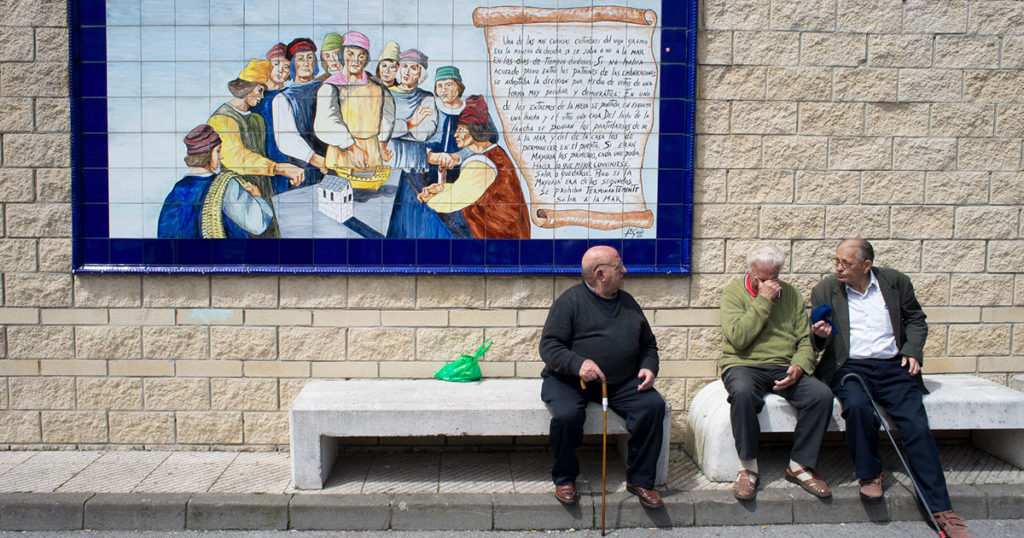
In August, when some two dozen new cases of coronavirus were detected in a single day in Gijón, the region of Asturias was a haven from the growing numbers of cases in other parts of Spain. Earlier the situation had been even better—two weeks in June with not a single new case on the books. It looked then like we had the virus beat. Some later blamed the president of Asturias for bragging about our pleasing numbers and suggesting the region as an ideal spot for a holiday. Visitors flocked here. By late October Asturias had an incidence of contamination as high as Madrid’s, having climbed steadily over the late summer and early fall, ever since the August surge. Those 25 cases were at an oceanfront bar called La Buena Vida, the good life. But it wasn’t so good that week for the wait staff who either became infected or found themselves losing income when the bar temporarily closed, or for customers who, if not infected, worried that they might have been.
It’s a Wonderful Life, asserts the movie title, and Jimmy Stewart goes roaring back into his life from the edge of despair once he understands this. A song title tells us nearly the same: What a Wonderful World. Much is at hand to be grateful for. But tell that to the Philip Larkin personage in his poem, “We met at the end of the party,” who cannot help thinking as he and a new companion wander through the last moments of a party, at the end of summer, of all they have missed, and he cannot enjoy the dregs of a leftover drink or the few late blossoms.
A friend of mine, employed for 37 years by a livestock feed company, was in line for early retirement this year, on his 61st birthday. Retirement age and benefits are set by the state, which pays the pensions, and in these hard times since the financial crisis of 2008, the age of retirement is slowly rising, a couple of months each year. Early retirement is a deal between the government, unions, and employers to retire workers who have served a certain number of years in positions requiring a high level of concentration or physical effort. Replacing these workers from the unemployment rolls reduces the company’s labor costs, reduces unemployment, and relieves old and tired workers, who walk away with a few extra years of retirement. But unless it’s stipulated in the contract, it’s not a right; the employer has to offer it.
My friend would retire at full salary, 20 percent paid by the employer, 80 percent by the government. After five years, when my friend reached the usual retirement age, the whole pension burden would revert to the government.
It sounded too good to be true. How does anyone benefit from that deal but you, I asked. He went through the numbers for me, saying how much the company would save on the lower salary of his replacement. The government would get another young person off unemployment and working. But with pension costs soaring, the government has steadily been curtailing eligibility for early retirement, and my friend was lucky to get it. Or so he thought until this year, when instead of calling him in to sign the papers, the company informed him no more employees were being offered the deal. My friend surmised that with huge pension obligations and an economy in worse shape than ever due to the pandemic, the government had told the company to axe the deals, probably in exchange for some subsidies from the EU. “Politics,” my friend said, despairingly.
Instead of five extra years of freedom, my friend’s got in store five more years of work. At least he’s got the salary that goes with it. “Puedes darte un canto en los dientes,” I could say, reminding him with this Spanish saying that things could be worse, that he’s lucky to have work in this country, and at a good salary too. “Go ahead, hit yourself in the teeth with a rock.”
Five years of labor instead of five years of freedom will never look good. I refrained from telling him he should feel lucky. Hit yourself in the teeth with a rock! What a strange saying. No matter how bad the alternative, slamming yourself in the face and cracking teeth is still not going to feel good. Those 25 cases at La Buena Vida felt as bad for the afflicted as any other cases. And that half-drunk cocktail left on a table at the end of the party—that’s not going to seem much of a prize. Though at least with the cocktail—with enough of them—you might forget the rotten luck you’re supposed to be grateful for.

